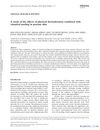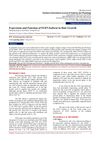 237 citations,
June 2013 in “Nature Medicine”
237 citations,
June 2013 in “Nature Medicine” A protein from certain immune cells is key for new hair growth after skin injury in mice.
 9 citations,
December 2013 in “Toxicological Research”
9 citations,
December 2013 in “Toxicological Research” Chamaecyparis obtusa oil may help hair grow similarly to minoxidil by affecting certain growth markers and cell factors.
 1 citations,
April 2023 in “Science Advances”
1 citations,
April 2023 in “Science Advances” High levels of ERK activity are key for tissue regeneration in spiny mice, and activating ERK can potentially redirect scar-forming healing towards regenerative healing in mammals.
 4 citations,
June 2016 in “Journal of Pharmacopuncture”
4 citations,
June 2016 in “Journal of Pharmacopuncture” Cornu cervi pantotrichum pharmacopuncture solution helps mice grow hair by increasing hair follicle cell growth and a growth factor important for hair development.
 April 2016 in “The journal of investigative dermatology/Journal of investigative dermatology”
April 2016 in “The journal of investigative dermatology/Journal of investigative dermatology” M2 macrophages help hair regrowth in wounds by making growth factors.
 5 citations,
October 2014 in “Journal of cosmetic and laser therapy”
5 citations,
October 2014 in “Journal of cosmetic and laser therapy” Combining physical dermabrasion with chemical peeling is more effective for skin treatment than chemical peeling alone.
7 citations,
March 2022 in “International Journal of Molecular Sciences” FGF21 can help reduce skin inflammation caused by C. acnes.
 9 citations,
July 2018 in “Current Pharmaceutical Design”
9 citations,
July 2018 in “Current Pharmaceutical Design” HO-1 helps skin health and healing but can worsen melanoma; it's a potential treatment target for skin diseases.
 2 citations,
November 2017 in “PloS one”
2 citations,
November 2017 in “PloS one” Some vitamin D analogs can thicken skin and reduce pore size like a common acne treatment, with one analog also affecting skin growth factors.
 April 2018 in “The journal of investigative dermatology/Journal of investigative dermatology”
April 2018 in “The journal of investigative dermatology/Journal of investigative dermatology” Ginseng and Albizia extracts may help prevent age-related hair thinning.
 2 citations,
February 2022 in “Human Gene Therapy”
2 citations,
February 2022 in “Human Gene Therapy” Increasing miR-149 reduces hair follicle stem cell growth and hair development by affecting certain cell growth pathways.
 245 citations,
January 2018 in “Bone Research”
245 citations,
January 2018 in “Bone Research” TGF-β is crucial for tissue repair and can cause diseases if not properly regulated.
 14 citations,
April 2016 in “Cell Transplantation”
14 citations,
April 2016 in “Cell Transplantation” Neural stem cell extract can safely promote hair growth in mice.
 December 2012 in “Journal of Dermatological Science”
December 2012 in “Journal of Dermatological Science” Estrogen increases a growth factor in hair cells which might affect hair loss.
 October 2023 in “International Journal of Cosmetic Science”
October 2023 in “International Journal of Cosmetic Science” WS Biotin, a new form of D-Biotin, improves water solubility and shows potential for hair and skin care without being toxic at low levels.
 15 citations,
January 2015 in “Pharmaceutical Biology”
15 citations,
January 2015 in “Pharmaceutical Biology” Chrysanthemum zawadskii extract may be a better treatment for hair loss than Minoxidil.
 58 citations,
March 2020 in “Scientific Reports”
58 citations,
March 2020 in “Scientific Reports” EGFR-TKIs can cause significant skin, nail, and organ side effects.
 69 citations,
August 1999 in “Developmental biology”
69 citations,
August 1999 in “Developmental biology” The nude gene causes skin cell overgrowth and improper development, leading to hair and urinary issues.
 46 citations,
August 2003 in “The journal of investigative dermatology/Journal of investigative dermatology”
46 citations,
August 2003 in “The journal of investigative dermatology/Journal of investigative dermatology” Phosphatidic acid may help hair grow by affecting cell growth pathways.
 1 citations,
June 2013 in “Science-business Exchange”
1 citations,
June 2013 in “Science-business Exchange” Increasing the levels of a protein called FGF9 can promote hair growth, but humans may not respond the same way due to a lack of certain cells.
 83 citations,
May 2013 in “International Journal of Molecular Sciences”
83 citations,
May 2013 in “International Journal of Molecular Sciences” Skin development in mammals is controlled by key proteins and signals from underlying cells, involving stem cells for maintenance and repair.
 86 citations,
October 2005 in “Experimental Dermatology”
86 citations,
October 2005 in “Experimental Dermatology” The Foxn1 gene mutation causes hairlessness and immune system issues, and understanding it could lead to hair growth disorder treatments.
64 citations,
January 2013 in “The journal of investigative dermatology/Journal of investigative dermatology” Human stem cells can help form hair follicles in mice.
 1 citations,
February 2021 in “Scholars international journal of anatomy and physiology”
1 citations,
February 2021 in “Scholars international journal of anatomy and physiology” Different forms of FGF5 either promote or inhibit hair growth.
 February 2024 in “ACS Omega”
February 2024 in “ACS Omega” The Shen Bai Hair Growing Decoction may help treat hair loss by promoting hair growth and reducing inflammation.
 6 citations,
June 2019 in “Biotechnology Letters”
6 citations,
June 2019 in “Biotechnology Letters” Gene therapy shows promise for improving wound healing, but more research is needed for human use.
 March 2024 in “Journal of Microbiology and Biotechnology”
March 2024 in “Journal of Microbiology and Biotechnology” Phloroglucinol may help improve hair loss by promoting hair growth and reducing oxidative stress.
 7 citations,
November 2022 in “Communications biology”
7 citations,
November 2022 in “Communications biology” Keratin injections can promote hair growth by affecting hair-forming cells and tissue development.
 13 citations,
July 2016 in “BMC Complementary and Alternative Medicine”
13 citations,
July 2016 in “BMC Complementary and Alternative Medicine” Hominis Placenta helps hair grow back by increasing cell growth and a specific growth factor.
161 citations,
August 2012 in “Seminars in cell & developmental biology” Hair growth and development are controlled by specific signaling pathways.



























